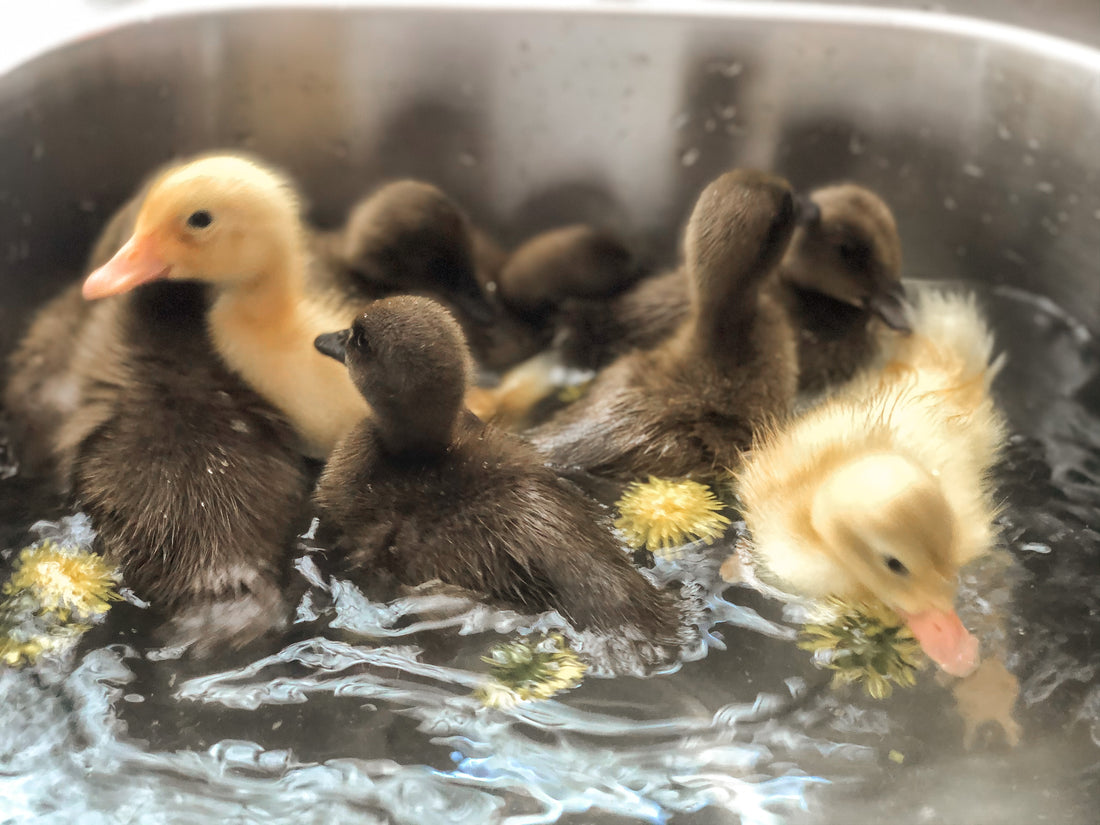I love ducks. They are so much fun and so. darn. cute. I'd even go as far as to say that I prefer ducks over chickens. There's just something about those webbed feet waddling everywhere and their cute little bills gulping down water. And not to mention watching them play around in the water! But to be honest, a lot goes into taking care of ducklings, so I've made a raising ducklings for beginners guide to help you along the process.
Getting your ducks
First and foremost, when getting a pet duck, you'll need to get at least 2. Ducks are very social and need other duck friends to prevent them from becoming lonely. 2-4 is a good starting number when purchasing ducklings. You'll also want to keep in mind the male to female ratio when picking out your ducks. It is best to have 1 male per 3-5 females to prevent over-mating or the females from getting injured. Alternatively, you could get only female, or only male, if you're not planning to breed them. However, if you are purchasing your ducklings from a local feed store for example, they often don't get sexed. In that case, you don't know which gender ducks you're getting which could lead to an uneven ratio of males to females. When ordering from a hatchery, you can choose which sex you want to ensure a good balance. Personally, we prefer ordering from My Pet Chicken and have always had great success getting our ducks and chickens safely in the mail.
So now you have your adorable ducklings! You'll want to make sure they are eating and drinking well once they are established in their brooder. Ducklings drink A LOT of water (plus they like to splash it out of their waterer) so be prepared to refill the waterer AND clean their bedding constantly. Water is especially important for ducklings because they need to be able to immerse their bills completely to clean their nostrils, so make sure the waterer is big enough to allow them to do so.
Along with the obvious food and water, you'll want to check your ducklings for a condition called pasty butt. This is especially common in chicks or ducklings that have been shipped in the mail due to the stress of constantly changing temperatures. Pasty butt is when the vent hole becomes plugged with hard stool. The stool sticks to the ducklings' down and continues to build up until it starts to act as a plug and prevents the excretion of the ducklings' waste. If left untreated, it could cause the duckling to die. To check for pasty butt, simply turn the duckling over and check its vent for any hard stool. If there is stool, soak area with warm water and gently rub off. Do not pull or this could rip out the ducklings' down.
Keeping them comfy
Just like chicks, ducklings will need to live in a brooder indoors for the first 7-9 weeks of their life (or until they are fully feathered). Your brooder should have some sort of bedding (I use pine shavings), a feeder, waterer, and heat source such as a heat lamp. I use a 28-gallon galvanized tub and keep it in our bathroom. At about 6 weeks (or whenever your ducklings are mostly feathered), you can remove the heat lamp from the brooder. Some people will tell you to measure the temperature and make sure its a certain degree, then decrease by 5 degrees each week - I don't find this necessary. I simply adjust the heat lamp so that it is only heating a portion of the brooder, this way if the ducklings are cold, they can congregate under the warmth of the lamp, but if not, they can move to the other portion that is a little cooler. If you see them shivering and bundled up in a small pile, you may want to adjust by giving them more warmth. Alternatively, if you see them panting (yep, they pant just like dogs), you'll want to decrease the temperature.

Once your ducks are a week old, you can let them go swimming! Start off in the bathtub or sink with a shallow amount of warm water, and while supervising them, let them have some fun. Don't leave them in there for too long or they may become too fatigued and could drown. You'll also notice the water won't bead up and roll off of them like it does with adult ducks. Ducklings don't produce their waterproofing oil until around 4 weeks of age, so be sure that when swim time is over, you dry them with a towel and immediately put them back in their warm brooder. If not, they could get too chilled and might not recover.
Food Requirements
Lastly, ducks have unique food requirements. You can either give them food specifically made for waterfowl, or you can give them chick starter/grower. You'll want to get the non-medicated kind because ducks don't require the same medications that chicks do. Ducks also tend to eat more than chicks, so overdose is possible when giving them medicated feed. Another consideration when using chick feed, is that ducks require more niacin than chicks, so you'll need to supplement with more niacin up until they are 20 weeks. I add in 1.5 tablespoons of Brewer's Yeast to each cup of feed. When it comes to protein requirements, for the first 3 weeks of your ducklings' lives, feed them 18-22% protein, then 15-16% protein until they reach 18 weeks, and 16% protein layer feed from there on out.
And there you have it, friends! You can now go get your cute little ducklings. They sure are a lot of work, but so worth it!


